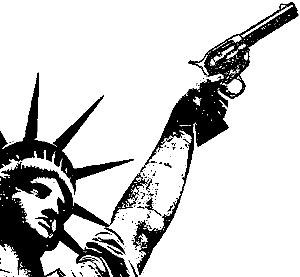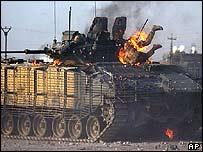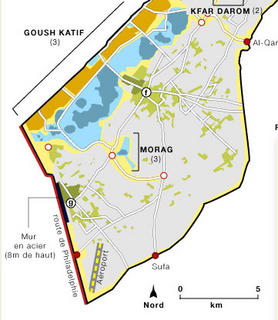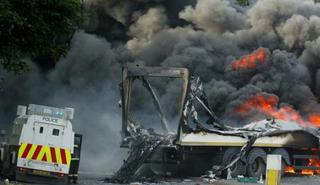Baghdad. In slightly more than a month, Saddam Hussein and several other figures of the former regime will be put on trial for the 1982 massacre of 150 villagers in Dujail. Meanwhile a number of difficulties lie in the way, most notably a challenge to the legitimacy of the Iraqi Special Tribunal, an argument for a change in venu to The Hague and the refusal on the part of President Talabani to sign any decree implementing the death penalty.
Baghdad. Abu Mussab al-Zarqawi declares "total war" on Iraq's Shi'a community.
Touz Khourmatou. Eleven people were killed and 24 wounded in a suicide carbombing of the al-Rasul al-Adam Mosque.
Ramadi. US Marine killed in action.
Karabila. Nine rebels killed in US airstrikes.
Baghdad. Two civilians were killed and 13 wounded when five carloads of gunmen opened fire on a crowd of unemployed men seeking day work in the Jadida Quarter.
Baghdad. President Jalal al-Talabani makes a "desperate plea" for help from the international community to prevent an inter-confessional war.
Baghdad. A Ministry of Transport vehicle was attacked in Baghdad's Canal street, killing two occupants and wounding two other.
Baghdad. Sheikh Fadl Alami, imam of the Imam Ali Mosque in Sadr City, was killed in a drive-by shooting.
Baghdad. A US military convoy was struck by a roadside bomb in the al-Adel quarter. Two US soldiers were wounded.
Hasswa. A suicide carbomb struck a police convoy, killing three police and wounding six others.
Iskandariya. Local government official Amar al-Khafaji was assassinated in his home along with four bodyguards by men in stolen military uniforms.
Baghdad. Last-minute amendments made to draft Constitutition. However, the document will not be submitted to a vote by Iraqi Parliament.
Ramallah. Palestinians accused Ariel Sharon of exploiting the Israeli evacution of the Gaza Strip at the United Nations summit without advancing the cause of peace. Meanwhile, the Road Map remains a "dead letter."
Neve Dekalim. Thousands of Hamas militants demonstrated brandishing automatic rifles and RPGs in Neve Dekalim, the former "capital" of the Gaza Strip. Several members of Egypt's Muslim Brotherhood were in attendance.
Rafah. The border crossing into Egypt continued to be a scene of chaos as hundreds breached the frontier barriers.
Jerusalem. Israeli Defense Minister Shaoul Mofaz ordered reinforced controls at the border crosings of Erez and Karni, the main transit point for goods entering the Gaza Strip. Meantime Shimon Peres told Bill Clinton in New York that border issues must be settled or the existence of the Gaza Strip is threatened. [Duh].
Bilin (West Bank). Four Israeli soldiers were injured by stone-throwing crowds [Aw, poor widdle stormtroopers]. Five Palestinians were injured by rubber bullets and six others were arrested.
Berlin. Israeli Finance Minister Ehud Olmert (talking out of his ass) suggested to the German weekly
Der Spiegel that Israel may abandon a part of its West Bank colonies.
Beirut. The UN peacekeeping force FINUL is attempting to negotiate the release of two Lebanese shepherds, Riad Moustapha and Hussein Kassem Zahra, kidnapped yesterday by an Israeli patrol in the Shebaa Farms sector between Lebanon and Israel. Israel accused the shepherds of spying on Israeli military installations for Hezbollah.
Washington. The USA has not yet reached a decision on whether to reduce its military presence in Afghanstan.
London. Former Israeli Chief of Staff Gen. Moshe Yaalon has abandoned plans to visit London where he risks being charged with war crimes. Yaalon was to attend a fundraiser for Israeli veterans.
Jerusalem. Two Israeli grand rabbis have demanded that Pope Benedict XVI condemn the destruction of abandoned synagogues in the Gaza Strip. Yona Metzger and Shlomo Amar were received by the Pope in Castelgandolfo.
Baghdad. A suicide carbomb struck a police patrol in the Dura quarter, killing 16 people, including ten police. 21 were wounded, including 13 police and 8 civilians.
Baghdad. Two simultaneous suicide carbombs struck struck a second police patrol in the Dura quarter, killing seven police and wounding 13 others.
Tall Afar. General Rick Lynch says the US assault on the city will continue.
Baghdad. A police officer was killed in a firefight with rebels in southwest Baghdad.
Baghdad. Three Shi'ite pilgrims travelling on foot to Karbala were shot dead in south Baghdad.
Baghdad. An employee of the Commerce Ministry was killed and 16 others wounded by a roadside bomb which struck their bus.
Mosul. The imam of the Rawda al-Wadi Mosque was killed by a bomb placed at the mosque's entrance.
Baquba. An Iraqi police officer was killed by rebels in an attack on a police station.
Iskandariyah. The bullet-ridden bodies of four kidnapped men were found 50 km south of the capital.
Baghdad. The bullet-ridden bodies of three men were found in north Baghdad.
Salaheddeen. Five Iraqis, including two police, were killled in separate incidents. Meanwhile, the abandoned, bullet-ridden body of an Iraqi solider was recovered.
Baghdad. The Iraqi Special Tribunal announced that Saddam Hussein will be tried for his responsibility in Operation Anfal, a 1988 operation in which thousands of Kurds were killed.
Dammam (Saudi Arabia). Al-Qaede condemns lies on the part of the Saudi Interior Ministry concerning recent clashes in Dammam.
Kabul. Elections to take place next Sunday in Afghanistan will not be perfect but will represent a step in the right direction, said UN Special Representative Filipo Grandi.
Kabul. A legislative candidate was shot while campaigning in Nuristan Province. Mrs. Hawa Nuristani suffered wounds to the arm and head and is in stable condition.
Kabul. Three Taliban were killed and two wounded in clashes with police in Oruzgan Province north of Kandahar.
Karachi. Pakistan security forces arrest seven activists said to be linked in al-Qaeda.
Baghdad. Iraqi authorities are negotiating with the Multinational Force led by the United States for the handover of security in several southern cities and towns.
New York. 57% of Americans surveyed by the Pew Institute believe that Iraq is becoming a second Vietnam.
London. Actress Julie Christie personally delivered a letter signed by a hundred celebrities, legislators and activists to PM Tony Blair demanding a pullout from Iraq.
Cairo. The Egyptian general prosecutor asked Parliament to lift immunity from prosecution from Ayman Nour, chairman of the al-Ghad Party. [Payback! How dare he run for President?]
Cairo. Egyptian Culture Minister Farouk Hosni resigned under criticism resulting from a theater fire on 5 September which killed 46 peopple.
Jerusalem. The Israeli Supreme Court ordered a change in the route of the Security Wall being constructed on the West Bank. The route would have cut the West Bank village of Kalkylia in half.
Ramallah. 16 Palestinian legislators have introduced a motion of censure against Prime Minister Ahmed Qorei, whom they hold responsible for chaos and anarchy in the evacuated Gaza Strip.








